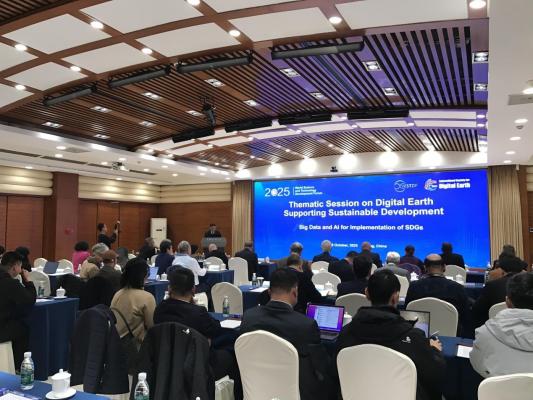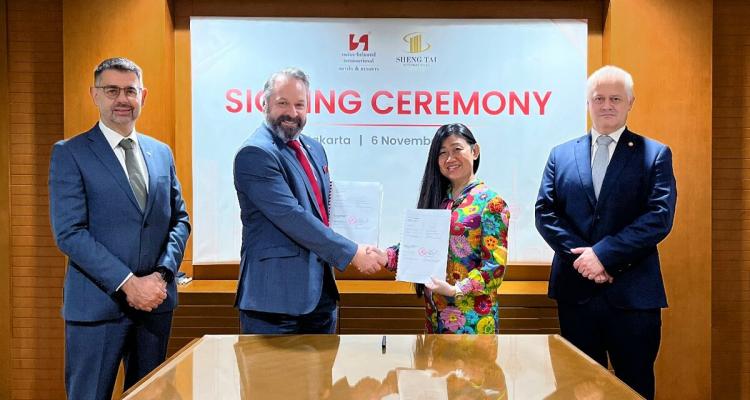- Home
- MediaOutReach
- 8 in 10 people in Singapore delayed medical care to prioritise work and avoid burdening family
8 in 10 people in Singapore delayed medical care to prioritise work and avoid burdening family
Rabu, 12 November 2025 | 08:00

SINGAPORE -
Media OutReach Newswire
- 11 November 2025 - Recognised globally for its excellence, Singapore
has built a strong healthcare system that provides efficiency and choice
to patients who cite high satisfaction levels with the medical care
they received. Despite this, 83 per cent of Singapore respondents said
they have delayed care in the past year, according to an Economist
Impact report commissioned by Prudential plc ("Prudential").
The report, "Patient voices Singapore: towards more informed and seamless care", found that many do so for personal reasons such as an obligation to prioritise work over self-care, and concern about being a financial or care-giving burden to family. Others felt their symptoms were not severe enough to seek help or were held back by previous bad experiences (Figure 2 in report).
Dr. Sidharth Kachroo, Chief Health Officer at Prudential Singapore, said this only compounds the problem and can escalate minor health conditions into major health and financial burdens later.
"Singapore has built a strong and well-resourced healthcare foundation. The path forward requires shifting the focus to making it a well-understood and easily accessible system for all. Support is available in both public and private sectors to provide patient choice and access to care. Payers, providers and policymakers can do more collectively to improve awareness of this support, so that patients feel more confident in seeking the care they need."
Patients want greater clarity on where to seek care
The findings suggested that ambiguity around the healthcare journey also contributes to Singapore respondents putting off care. Sixty-one per cent of respondents said they don't feel they have the right information to make a decision on treatment and 60 per cent said that they often don't know where to go when something is wrong (Figure 3 in report).
Initiatives such as Healthier SG[1] which emphasise the central role of family doctors in Singapore's integrated healthcare system help to provide clarity on where and how to start the patient journey.
Dr. Sarah Lu, Managing Director (Singapore Healthcare), Raffles Medical Group and Executive Medical Director, Raffles Hospital, said: "By actively managing our health with the help of our Family Physicians (FP), we reinforce the focus for preventive, proactive and personalised care. This sustained relationship with our FPs engages our patients to be part of a shared healthcare journey, building a strong foundation for many healthy years ahead.
"Where escalation of care is necessary, FPs play a central role coordinating and managing the health of patients together with the specialists, ensuring a smooth and integrated care journey."
When asked about the factors that offer the greatest sense of support, confidence and peace of mind when seeking medical care, 39 per cent of respondents said that they prefer healthcare that causes minimal disruption to daily life and 31 per cent wanted guidance throughout the care process (Figure 6 in report).
Arjan Toor, CEO, Health, Prudential plc, said: "At Prudential, we believe that improving the patient experience starts with a deep understanding of what patients truly need to experience peace of mind. Our Patient Voices study has helped us understand that many patients face uncertainty and confusion when seeking care. That's why we're focused on removing the worry and hassle — by helping patients find the right doctor, understand what they're covered for, and know what to expect when it comes to costs. By guiding them every step of the way, we're making healthcare more accessible and less overwhelming — so that patients can focus on the thing that matters most, which is to get better."
More certainty on healthcare costs is needed
Certainty around costs is another important area raised by the respondents surveyed. Despite a strong financial safety net in public and/or private health insurance, 23 per cent of those who delayed care cited cost as a reason (Figure 2 in report). Furthermore, just over six in 10 worried if they could pay for care they needed (Figure 3 in the report), while about half found bills higher than expected in the past year.
Nidhi Swarup, founding chairperson of the Alliance of Patients' Organisations Singapore, said in the report: "The conversation about costs starts only when they're at the emergency department. That's when people say, 'We didn't expect the cost to be so high'. People need a lot of education about how to plan for unexpected medical costs."
Singapore's S+3M[2] is the bedrock of the country's healthcare system and keeps essential care affordable at restructured hospitals. Those who want additional coverage at higher tier wards, or treatment at private hospitals, can consider Integrated Shield Plans to complement and offer extra cover.
The national fee benchmarks provided by the Ministry of Health, and the Health Insurance Planner[3] bill comparison tool which compares Integrated Shield Plan premiums and provides cost projections, also help individuals plan for the future.
Dr. Kachroo added: "Health insurers play a role in ensuring that policyholders get access to affordable, high-quality care. Our financial representatives help people plan how they can afford their preferred type of care and understand what's covered or paid out-of-pocket.
"Through Prudential's preferred panel hospital partnerships, we give our policyholders quality care and greater cost certainty as fees are agreed upfront, and our concierge officers are on-site at the hospital to clarify policy queries. These are all vital elements to a positive patient journey and experience.
"Health crises can hit when we least expect it, so our goal is simple. Provide patients in Singapore the confidence and certainty to seek the right healthcare when and where they need it most."
About the report
"Patient voices Singapore: towards more informed and seamless care" is an Economist Impact report, commissioned by Prudential, and examines how people in Singapore experience healthcare. The analysis was based on a survey of 1,024 adults aged 18 to over 80 years old in the country between April and May 2025, and includes insights from three local experts.
The full report can be accessed here.
https://www.prudential.com.sg/
https://sg.linkedin.com/company/prudential-assurance-company-singapore
https://www.facebook.com/PrudentialSingapore/
https://www.instagram.com/prudentialsingapore/'hl=en
The report, "Patient voices Singapore: towards more informed and seamless care", found that many do so for personal reasons such as an obligation to prioritise work over self-care, and concern about being a financial or care-giving burden to family. Others felt their symptoms were not severe enough to seek help or were held back by previous bad experiences (Figure 2 in report).
Dr. Sidharth Kachroo, Chief Health Officer at Prudential Singapore, said this only compounds the problem and can escalate minor health conditions into major health and financial burdens later.
"Singapore has built a strong and well-resourced healthcare foundation. The path forward requires shifting the focus to making it a well-understood and easily accessible system for all. Support is available in both public and private sectors to provide patient choice and access to care. Payers, providers and policymakers can do more collectively to improve awareness of this support, so that patients feel more confident in seeking the care they need."
Patients want greater clarity on where to seek care
The findings suggested that ambiguity around the healthcare journey also contributes to Singapore respondents putting off care. Sixty-one per cent of respondents said they don't feel they have the right information to make a decision on treatment and 60 per cent said that they often don't know where to go when something is wrong (Figure 3 in report).
Initiatives such as Healthier SG[1] which emphasise the central role of family doctors in Singapore's integrated healthcare system help to provide clarity on where and how to start the patient journey.
Dr. Sarah Lu, Managing Director (Singapore Healthcare), Raffles Medical Group and Executive Medical Director, Raffles Hospital, said: "By actively managing our health with the help of our Family Physicians (FP), we reinforce the focus for preventive, proactive and personalised care. This sustained relationship with our FPs engages our patients to be part of a shared healthcare journey, building a strong foundation for many healthy years ahead.
"Where escalation of care is necessary, FPs play a central role coordinating and managing the health of patients together with the specialists, ensuring a smooth and integrated care journey."
When asked about the factors that offer the greatest sense of support, confidence and peace of mind when seeking medical care, 39 per cent of respondents said that they prefer healthcare that causes minimal disruption to daily life and 31 per cent wanted guidance throughout the care process (Figure 6 in report).
Arjan Toor, CEO, Health, Prudential plc, said: "At Prudential, we believe that improving the patient experience starts with a deep understanding of what patients truly need to experience peace of mind. Our Patient Voices study has helped us understand that many patients face uncertainty and confusion when seeking care. That's why we're focused on removing the worry and hassle — by helping patients find the right doctor, understand what they're covered for, and know what to expect when it comes to costs. By guiding them every step of the way, we're making healthcare more accessible and less overwhelming — so that patients can focus on the thing that matters most, which is to get better."
More certainty on healthcare costs is needed
Certainty around costs is another important area raised by the respondents surveyed. Despite a strong financial safety net in public and/or private health insurance, 23 per cent of those who delayed care cited cost as a reason (Figure 2 in report). Furthermore, just over six in 10 worried if they could pay for care they needed (Figure 3 in the report), while about half found bills higher than expected in the past year.
Nidhi Swarup, founding chairperson of the Alliance of Patients' Organisations Singapore, said in the report: "The conversation about costs starts only when they're at the emergency department. That's when people say, 'We didn't expect the cost to be so high'. People need a lot of education about how to plan for unexpected medical costs."
Singapore's S+3M[2] is the bedrock of the country's healthcare system and keeps essential care affordable at restructured hospitals. Those who want additional coverage at higher tier wards, or treatment at private hospitals, can consider Integrated Shield Plans to complement and offer extra cover.
The national fee benchmarks provided by the Ministry of Health, and the Health Insurance Planner[3] bill comparison tool which compares Integrated Shield Plan premiums and provides cost projections, also help individuals plan for the future.
Dr. Kachroo added: "Health insurers play a role in ensuring that policyholders get access to affordable, high-quality care. Our financial representatives help people plan how they can afford their preferred type of care and understand what's covered or paid out-of-pocket.
"Through Prudential's preferred panel hospital partnerships, we give our policyholders quality care and greater cost certainty as fees are agreed upfront, and our concierge officers are on-site at the hospital to clarify policy queries. These are all vital elements to a positive patient journey and experience.
"Health crises can hit when we least expect it, so our goal is simple. Provide patients in Singapore the confidence and certainty to seek the right healthcare when and where they need it most."
About the report
"Patient voices Singapore: towards more informed and seamless care" is an Economist Impact report, commissioned by Prudential, and examines how people in Singapore experience healthcare. The analysis was based on a survey of 1,024 adults aged 18 to over 80 years old in the country between April and May 2025, and includes insights from three local experts.
The full report can be accessed here.
[1] For more information on Healthier SG:
https://www.healthiersg.gov.sg/about/what-is-healthier-sg/
[2] For more information on S+3M (Subsidies, MediSave, MediShield Life and MediFund):
https://www.moh.gov.sg/managing-expenses/keeping-healthcare-affordable/managing-medical-bills/#f3b85daa745d0ae7958389adac8cb292
[3] For more information on the Health Insurance Planner tool, please visit:
https://www.cpf.gov.sg/member/tools-and-services/planners/cpf-planner-health-insurance
https://www.prudential.com.sg/
https://sg.linkedin.com/company/prudential-assurance-company-singapore
https://www.facebook.com/PrudentialSingapore/
https://www.instagram.com/prudentialsingapore/'hl=en
BERITA LAINNYA

Rabu, 12 November 2025 | 08:17

Rabu, 12 November 2025 | 08:13

Rabu, 12 November 2025 | 08:10
Rabu, 12 November 2025 | 08:09

Rabu, 12 November 2025 | 08:06

Rabu, 12 November 2025 | 08:05

Rabu, 12 November 2025 | 08:04

Rabu, 12 November 2025 | 08:02

Rabu, 12 November 2025 | 08:01

Rabu, 12 November 2025 | 08:00
























